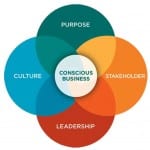 This webpage presents both a conservative and an idealistic ROI for spirituality in strategic business relationships (long-term value-creating relationships). It substantiates real-world benefits based on research by the Conscious Capitalism Institute.
This webpage presents both a conservative and an idealistic ROI for spirituality in strategic business relationships (long-term value-creating relationships). It substantiates real-world benefits based on research by the Conscious Capitalism Institute.
Why should management care that their strategic relationship managers use spiritual principles? What benefits will result from the practical use of spirituality in business?
This document answer questions about the business value of spirituality; it sets context, provides food-for-thought and frames on-going dialogue. Upper management is focused on ROI. The outstanding success of conscious businesses indicates that some of the ROI calculations below may be conservative.
This webpage presents a range of ROI calculations for spirituality in business relationships.
ROI = 8.5, 1,000 or 2,000
.
Return
How will spirituality in strategic alliance benefit a business?
- 1.9% increase in overall revenue.
- $19 million revenue increase for a $1 billion dollar business.
Here are the real-world factors used in calculating this Return:
- One-third of a business’ revenue is directly tied to alliances. This trend is increasing at a rate of 25% each year. 1
- More than 57% of all strategic alliances fail to create their expected value. 2
- Over 40% of alliance failures are due to poor relationships defined by low trust, poor communication, ineffective collaboration, unhealthy divisiveness, fear and a climate oriented toward scarcity (i.e., “your win is my loss”). 2
- Spirituality deepens relationship, enabling greater value-creation.
- With improved relationships, failure rates will decrease. If relationship-caused failures are reduced from 40% to 30%, there will be a 5.7% increase in alliance success. 3
- Given one-third of a business’ revenue is tied to alliances this would result in a 1.9% increase in overall revenue, or $19 million for a $1 billion business (there are benefits to the overall business, beyond the alliances, too).
You might ask “Are returns of $19 million reasonable to expect?” My experience saw an “impossible” deal that was valued at over $200 million accomplished due to the application of practical spiritual principles. 4
Spirituality in business works.
.
Investment
What investments might be required in order to transform today’s abysmal “success” rates in alliances and then to capitalize on new value-creating opportunities? Below are estimates:
- $300,000 to increase spirituality. Three years of sustained and sustaining engagement as an extended member of your team (one-third time commitment for extensive training and related services).
Note: This very high-end investment estimate is used in order to calculate a very conservative ROI number. This high level of investment might be called for if a company: (a) was extremely interested in spirituality, (b) realized they had a long way to go, and (c) were willing to invest in extending their team over a three year period. Again, this is a very high-end investment used to help calculate a conservative ROI calculation.
- $1.7 million (estimated) to capitalize on new opportunities that will emerge in the alliance. For example, incremental investments required to create and deliver new products, services or solutions to the market.
- Total Investment: $2 million
.
ROI Calculation
ROI = (Return – Investment) / Investment.
ROI = ($19M – $2M) / $2M = 8.5
 This theoretical calculation is simplistic and conservative. It is simplistic because ROI numbers are often used to compare investment options; standalone or absolute ROI calculations may have limited value.
This theoretical calculation is simplistic and conservative. It is simplistic because ROI numbers are often used to compare investment options; standalone or absolute ROI calculations may have limited value.
The ROI number above is conservative in a couple of ways. First, the theoretical investment (above) is likely higher than necessary. If a company is already conscious, or is interested in being a conscious business (see Conscious Capitalism Movement, below), it will require less investment than $300,000 over a three-year period. Perhaps an investment of $50,000 over that same period of time might be sufficient to help transform their alliance managers.
Secondly, if a business is serious about fundamental change, their entire ecosystem will be positively impacted. They will become easier to work with and they will naturally attract greater value-creation. In such a situation a return of 5-10% in overall revenue seems reasonable, or a $50-100 million return for a $1 billion company.
ROI = between 1,000 and 2,000.
The ROI for spirituality does have a limit, it is infinity. Given investment in spirituality calls for a change in attitude and mindset, choosing a different perspective and the embodiment of simple ideas that deepen relationship, the investment can be $0. In such a case, where the denominator is zero, the ROI becomes infinite, no matter the return.
As a final real-world comment on the conservative nature of these ROI calculations, consider that conscious (spiritually-oriented) businesses significantly outperform the S&P 500 by a 10:1 ratio (see the next section on the Conscious Capitalism Movement).
Spirituality in business works.
It pays off.
.
Conscious Capitalism Movement
 There is an established movement toward the use of spirituality in business called “conscious capitalism”. The movement, book and organization (all by the same name) are referred to here as evidence to validate spirituality in strategic alliances and to provide further arguments for the real-world value of spirituality in business.
There is an established movement toward the use of spirituality in business called “conscious capitalism”. The movement, book and organization (all by the same name) are referred to here as evidence to validate spirituality in strategic alliances and to provide further arguments for the real-world value of spirituality in business.
The use of the phrase “conscious capitalism” is attributed to Patricia Aburden in the book Megatrends 2010: the rise of conscious capitalism (published in 2005, the year I voluntarily left HP to pursue spirituality in alliances). The phrase “spirituality in business” appears 24 times in her book. And, the book’s central chapter is titled “Spirituality in Business” with the following quote:
Spirituality in business, having quietly blossomed for decades,
is an established trend that’s about to morph into a megatrend.
Conscious Capitalism as a formal organization started in 2007 (unbeknownst to me this was also the year I started writing my book).
 The Four Tenets of Conscious Capitalism embrace spirituality. Higher Purpose is about collective vision; it is about deeply learning from the voice-of-the-collective, the spirit that lives in the midst of any organization. Stakeholder integration embraces oneness, doing the greatest good for all (not just shareholders).
The Four Tenets of Conscious Capitalism embrace spirituality. Higher Purpose is about collective vision; it is about deeply learning from the voice-of-the-collective, the spirit that lives in the midst of any organization. Stakeholder integration embraces oneness, doing the greatest good for all (not just shareholders).
Conscious Leadership as well as Conscious Culture and Management (the 3rd and 4th Tenets) are obviously about consciousness which is synonymous with spirituality. These Tenets are about bringing love into the world of business. In fact the word “love” appears in the book Conscious Capitalism 138 times. “Spiritual” is there 42 times and “relationship” is used 92 times (spirituality is about the deepening of relationship).
.
Conscious Businesses Outperform
Here is a growing list of conscious companies: 3M, Adobe, Amazon, Autodesk, Boston Beer Company, Bon Appetit Management Co., BMW, CarMax, Chipotle, Chubb, Cipla (India), Clif Bar, Cognizant, Colgate-Palmolive, Costco, Driscoll’s, FedEx, Google, Harley-Davidson, Honda, Honest Tea, IBM, IDEO, IKEA, J.M. Smucker, L.L. Bean, Marriott International, MasterCard Worldwide, Nordstrom, Novo Nordisk, Panera, Patagonia, Qualcomm, REI, SAS Institute, Schlumberger, Southwest Airlines, Starbucks, Stonyfield Yogurt, T. Rowe Price, Tata Consultancy Services (India), The Container Store, The Motley Fool, Toyota, Trader Joe’s, Unilever, United Parcel Service, Walt Disney, Wegmans and Whole Foods Market. 5
By focusing on both the tangible and intangible forms of value, conscious businesses grow much faster than their competition (who focus solely on tangible value) with vastly superior bottom-line financial performance. Consider the following facts: 5
- Compared to the S&P 500, conscious businesses have outperformed the market by a 4:1 ratio over 5 years, an 8:1 ratio over 10 years and a 10.5:1 ratio over 15 years.
- Compared to Good to Great companies, conscious businesses have outperformed them by a 9.3:1 ratio over a 15 year period. Conscious companies are greater than great.
Other indicators of the value of spirituality:
- The stock market performance of “great places to work” (business’ who love their employees and customers) outperformed S&P 500 by a 3:1 ratio over a 5 year period.
- Highly ethical companies have outperformed the S&P 500 by an average of 7.3 percent annually since 2007.
Spirituality in business works.
And, it does pay off.
Spirituality is the science of relationship and so it is the art of strategic alliances. It transforms strategic alliances from mostly failing to mostly succeeding. Spirituality is also about the fundamental transformation of businesses, enabling them to be more conscious and loving, toward all stakeholders, not just shareholders.
With a focus on the intangible forms of value (e.g., trust, open communication, atmosphere, love), greater tangible forms of value naturally occur (e.g., sales).
Spirituality in business relationships
leads to increased value for all.
.
Next Step
1. Simple Rules for Making Alliances Work by Jonathan Hughes and Jeff Weiss, Harvard Business Review, November 2007; the Association of Strategic Alliance Professionals, 2007 Summit. Also, consider that alliances are the most challenging form of business relationships, lessons learned in alliances, that improve effectiveness, can be applied to other forms of business relationships and throughout business.
2. For information on the cause of strategic alliance failures see Managing Alliances for Business Results: Lessons Learned from Leading Companies by Jeff Weiss, Sara Keen and Stuart Kliman; Vantage Partners LLC. Three years of research of over 100 alliance managers and executives representing 93 companies in a broad range of industries.
3. Here’s the logic: 57% of alliances fail to achieve their value-creating potential and more than 40% of failures are caused by poor or damaged relationship; this means that 22.8% of alliances fail due to relationship issues. If instead 30% of the failures were due to relationship (a 25% improvement), that would reduce alliance failures due to relationship issues to 17.1%, which is a 5.7% reduction in overall alliance failure rate.
4. Refer to the HP/SAP alliance “deal” packet (incremental value slide, press release packet and award) as well as the endorsement (professional evaluation) by my manager at the time that refers to the HP/SAP initiative. Spiritual insights gained during this time are represented throughout this website, in my book, writings and most poignantly in a practice called self-obsolescence (see the Results section on that webpage for an example from HP/SAP alliance). You might also read about what it means to be a peacemaker in business.
5. Firms of Endearment: how world-class companies profit from passion and purpose (2nd edition) by Raj Sisodia, Jag Sheth and David Wolfe; and Conscious Capitalism: liberating the heroic spirit of business by John Mackey and Raj Sisodia.
